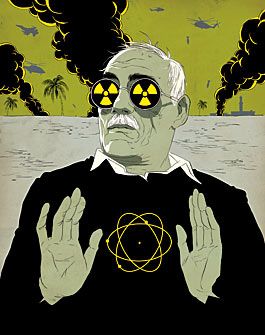| View previous topic :: View next topic |
| Because corporations cannot be trusted to voluntarily protect the environment, they require regulation. |
| Strongly Agree |
|
71% |
[ 15 ] |
| Agree |
|
19% |
[ 4 ] |
| Disagree |
|
0% |
[ 0 ] |
| Strongly Disagree |
|
9% |
[ 2 ] |
|
| Total Votes : 21 |
|
| Author |
Message |
Nowhere Man

Joined: 08 Feb 2004
|
 Posted: Mon May 09, 2005 3:16 am Post subject: Corporate regulation vs. the environment Posted: Mon May 09, 2005 3:16 am Post subject: Corporate regulation vs. the environment |
 |
|
Because corporations cannot be trusted to voluntarily protect the environment, they require regulation.
This is another poll stemming from the political compass test. |
|
| Back to top |
|
 |
tommynomad

Joined: 24 Jul 2004
Location: on the move
|
 Posted: Mon May 09, 2005 4:06 pm Post subject: Posted: Mon May 09, 2005 4:06 pm Post subject: |
 |
|
Corporations by definition have one goal: make $$$. Everything else is subordinate to that goal. Including the environment. Anita Roddick would chew through old-growth tree trunks with her teeth if the alternative was losing her company.
But under US law, corporations have the same rights as people (14th amendment?). I dunno who came up with that idea, but I can tell you:
that n*ggah's craaaazee. |
|
| Back to top |
|
 |
ulsanchris
Joined: 19 Jun 2003
Location: take a wild guess
|
 Posted: Mon May 09, 2005 11:16 pm Post subject: Posted: Mon May 09, 2005 11:16 pm Post subject: |
 |
|
| Interestingly enough many coporations in the US right now are voluntarily following tougher environmental standards then are set down by the US government. |
|
| Back to top |
|
 |
Manner of Speaking

Joined: 09 Jan 2003
|
 Posted: Tue May 10, 2005 12:44 am Post subject: Posted: Tue May 10, 2005 12:44 am Post subject: |
 |
|
| There are also literally thousands of examples where goverment environmental regulations have created jobs, new industries, and corporate innovation in products and technology. |
|
| Back to top |
|
 |
R. S. Refugee

Joined: 29 Sep 2004
Location: Shangra La, ROK
|
|
| Back to top |
|
 |
canuckistan
Mod Team


Joined: 17 Jun 2003
Location: Training future GS competitors.....
|
 Posted: Tue May 10, 2005 1:43 am Post subject: Posted: Tue May 10, 2005 1:43 am Post subject: |
 |
|
| With shareholder pressure to squeeze the most profit out of the bottom line, I can imagine there's little enthusiasm amongst many for big expenditures of pollution-control technology. |
|
| Back to top |
|
 |
Nowhere Man

Joined: 08 Feb 2004
|
 Posted: Wed May 11, 2005 1:27 am Post subject: ... Posted: Wed May 11, 2005 1:27 am Post subject: ... |
 |
|
I think this is also a no-brainer.
Whether they're above or below current standards, the concept of trusting them to regulate themselves is ludicrous.
My own personal take is that corporations are so successful at least partially because they de-humanize business. There is no one person fully in charge, but a group of people instead. Of course you have a CEO, but his responsibilty is diffused the same way a President's responsibility is, leaving room for a lot of monkey business. Especially ethical monkey business.
The good and bad result is ruthless efficiency.
Either way, I suppose they're here to stay. But when it comes to regulation, yes. YES. |
|
| Back to top |
|
 |
Nowhere Man

Joined: 08 Feb 2004
|
 Posted: Mon Dec 04, 2006 9:32 am Post subject: ... Posted: Mon Dec 04, 2006 9:32 am Post subject: ... |
 |
|
I was looking through old posts for things related to the political compass test.
I think this is the only thread that remains.
Anyway. Just thought I'd haul it out since the test is back on the forum. |
|
| Back to top |
|
 |
Moldy Rutabaga

Joined: 01 Jul 2003
Location: Ansan, Korea
|
 Posted: Tue Dec 05, 2006 3:13 am Post subject: Posted: Tue Dec 05, 2006 3:13 am Post subject: |
 |
|
In the long run, it may be economically advantageous for corporations to be green; with the internet relaying information at light-speed, corporations who pollute can be outed extremely quickly and investors can move their money into places that won't risk a consumer backlash. That's the optimist in me, after reading too much Tom Friedman.
But both situations imply a kind of coercion, either from government or from investor/consumer groups. Would corporations do such things voluntarily if no one was watching? There might be precedents, but normally extremely unlikely; yeah, a no-brainer.
Ken:> |
|
| Back to top |
|
 |
ddeubel

Joined: 20 Jul 2005
|
 Posted: Tue Dec 05, 2006 3:52 am Post subject: Posted: Tue Dec 05, 2006 3:52 am Post subject: |
 |
|
| Quote: |
| In the long run, it may be economically advantageous for corporations to be green; with the internet relaying information at light-speed, corporations who pollute can be outed extremely quickly and investors can move their money into places that won't risk a consumer backlash. That's the optimist in me, after reading too much Tom Friedman. |
I was thinking the same thing as I read over the posts, then got to yours......
Basically my question was a little different than yours. It was, "why are corporations necessicarily solely "profit" oriented and who made it so, who set this bar up there? Can't corporations, of their own will, set themselves out standards to adhere to, especially in regards to being "clean' (I like this word better than green).
I don't think we have to automatically say that corporations can't be trusted because it's all about the money.....yes, that is a priority, like air..... but there are other things and in the social realm we call them water, food, social interaction/worth. Goes for corporations.
I think society must be more proactive and demanding. Demand that the dialogue of business include being clean and sustaining. Demand that corporations do the right thing. It might just become part of their ethos and not just a token mention in their mission statement.
But I think the question persists and I put it out there to others...why can't corporations, much like an individual, live and die by other standards than the dollar/won/yen/bolivar or krone? I think like cigarette smoking, you don't need govt enforcement so much as govt cheerleading and education...most will move in the other direction.
DD |
|
| Back to top |
|
 |
Moldy Rutabaga

Joined: 01 Jul 2003
Location: Ansan, Korea
|
 Posted: Tue Dec 05, 2006 5:16 am Post subject: Posted: Tue Dec 05, 2006 5:16 am Post subject: |
 |
|
Interesting questions. I confess I don't know a great deal about the organizational theory of corporations. But my guess is that corporations aren't 'evil' in the way we often say they are, but rather they are amoral structures. Because power tends to be so heavily diluted among many agents, no single person is capable of exercising moral restraint against group decisions. Why can't they all agree on a moral code? I guess because stockholders tend to hold final power and are in large groups that aren't always likely to act in concert, the goal of the corporation tends to be non-moral-- maximization of profit. This goal often tends to conflict with doing the right thing, but when it doesn't and they are compatible, there's no controversy or people hurt and we don't read about it.
I do not know how the present capitalist stockholder system of investments can become moral, as opposed to non-moral. I see only a combination of government policies, protection for whistleblowers, consumer boycotts and support, and hopefully also a degree someday of wilful cooperation. Sadly, that might happen only when an environmental emergency makes it immediately necessary (a polluted river) or a crisis so morally ugly that the industry feels threatened as a whole (Enron).
Ken:> |
|
| Back to top |
|
 |
Octavius Hite

Joined: 28 Jan 2004
Location: Househunting, looking for a new bunker from which to convert the world to homosexuality.
|
 Posted: Tue Dec 05, 2006 6:14 am Post subject: Posted: Tue Dec 05, 2006 6:14 am Post subject: |
 |
|
Of course the government should regulate. 2 reasons why (and yes I am a libertarian as long as what you do doesn't hurt another, hus pollution doesn't get a libertarian exemption) theyshould regulate.
1. Because corporations are only concerned with the next quarter they have no long term vision, if they did they would no that taking all the fish (for example) in an unregulated manner will mean that the industry will eventually collapse.
2. Government intervention and regulation has forced companies to do things they didnt want to which spurs innovation. i.e. seatbelts, airbags, airplanes, space travel, nuclear power, solar power, etc etc etc none of these tnings would be around if not for government regulation and government support of some kind. |
|
| Back to top |
|
 |
|

